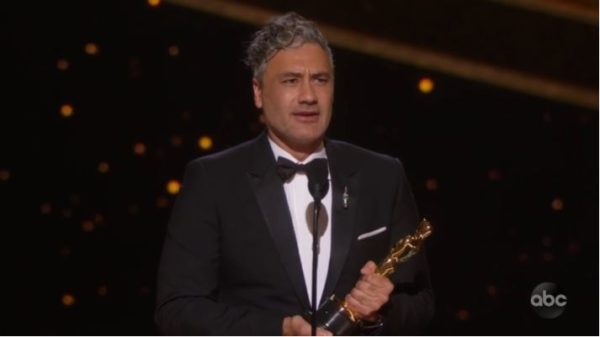
- Details
- By Rich Tupica
As “May the 4th Be With You” memes spread across social media today, it was announced that Academy Award winner Taika Waititi (Māori) will direct and co-write a new Star Wars feature film for theatrical release.
Back in January, rumors began to swirl that the acclaimed Indigenous director was being courted to direct the film following a Hollywood Reporter story, though Disney and Lucasfilm declined to comment at the time. That changed today after Disney confirmed the news. The yet-to-be-titled feature is slated for a 2024 release, according to IMDB.
 The new ‘Star Wars’ film is yet to be titled and is set for a 2024 release in theaters. (courtesy image)
The new ‘Star Wars’ film is yet to be titled and is set for a 2024 release in theaters. (courtesy image)
Waititi, a New Zealand native who recently won Best Adapted Screenplay for Jojo Rabbit, will be joined by Academy Award nominee Krysty Wilson-Cairns (1917, Last Night in Soho), who will co-write the forthcoming Star Wars screenplay. Back in February, at the 92nd Oscars, the 44-year old Waititi thoughtfully recognized not only his mother during his speech for Jojo Rabbit, producers and film crew, but also Indigenous people around the world.
“I dedicate this to all the Indigenous kids in the world who want to do art and dance and write stories,” he said in front of Hollywood-industry elites and millions of television viewers. “We are the original storytellers and we can make it here as well.”
Closing his speech, Waititi signed off with “kia ora,” a famous Māori phrase meaning “be safe.” He is the first Oscar winner of Māori decent. Māori are the tangata whenua, the indigenous people, of New Zealand.
More Stories Like This
Native News Weekly (August 25, 2024): D.C. BriefsUS Presidents in Their Own Words Concerning American Indians
Two Murdered on Colville Indian Reservation
NDAA passes House; Lumbee Fairness Act Advances
NFL, Vikings to Host Native All-American Game, Youth Flag Clinic
Help us defend tribal sovereignty.
At Native News Online, our mission is rooted in telling the stories that strengthen sovereignty and uplift Indigenous voices — not just at year’s end, but every single day.
Because of your generosity last year, we were able to keep our reporters on the ground in tribal communities, at national gatherings and in the halls of Congress — covering the issues that matter most to Indian Country: sovereignty, culture, education, health and economic opportunity.
That support sustained us through a tough year in 2025. Now, as we look to the year ahead, we need your help right now to ensure warrior journalism remains strong — reporting that defends tribal sovereignty, amplifies Native truth, and holds power accountable.
 The stakes couldn't be higher. Your support keeps Native voices heard, Native stories told and Native sovereignty defended.
The stakes couldn't be higher. Your support keeps Native voices heard, Native stories told and Native sovereignty defended.
Stand with Warrior Journalism today.
Levi Rickert (Potawatomi), Editor & Publisher
